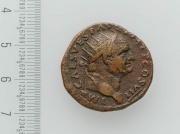Difference between revisions of "Orichalcum"
Jump to navigation
Jump to search
(username removed) |
(username removed) |
||
| Line 14: | Line 14: | ||
== Authority == | == Authority == | ||
| − | * | + | * Jack Odgen, ''Jewellery of the Ancient World'', Rizzoli International Publications Inc., New York City, 1982 |
* Wikipedia, the free encyclopedia, at http://www.wikipedia.com Comment: http://en.wikipedia.org/wiki/Orichalcum (Accessed Nov. 9, 2005) | * Wikipedia, the free encyclopedia, at http://www.wikipedia.com Comment: http://en.wikipedia.org/wiki/Orichalcum (Accessed Nov. 9, 2005) | ||
| − | * | + | * Random House, ''Webster's Encyclopedic Unabridged Dictionary of the English Language'', Grammercy Book, New York, 1997 |
[[Category:Materials database]] | [[Category:Materials database]] | ||
Revision as of 06:38, 24 July 2013
Description
A copper/zinc alloy that has a high percentage of zinc. Orichalcum was said to have been mined in Atlantis in ancient times. It used for jewelry and, according to Plato, to line the outer walls of the Temple to Poseidon on Atlantis. By Roman times, the alloy was used for coinage and jewelry. Orichalcum alloy is easy to cast, is ductile, and has a golden color (Odgen, 1982).
Synonyms and Related Terms
mountain copper; zinc bronze; orichalque (Fr.); oricalco (It.); Aurichalcum (Deut.)
Additional Information
J. Ogden, Jewelry of the Ancient World, Rizzoli International Publications, New York, 1982.
Authority
- Jack Odgen, Jewellery of the Ancient World, Rizzoli International Publications Inc., New York City, 1982
- Wikipedia, the free encyclopedia, at http://www.wikipedia.com Comment: http://en.wikipedia.org/wiki/Orichalcum (Accessed Nov. 9, 2005)
- Random House, Webster's Encyclopedic Unabridged Dictionary of the English Language, Grammercy Book, New York, 1997
